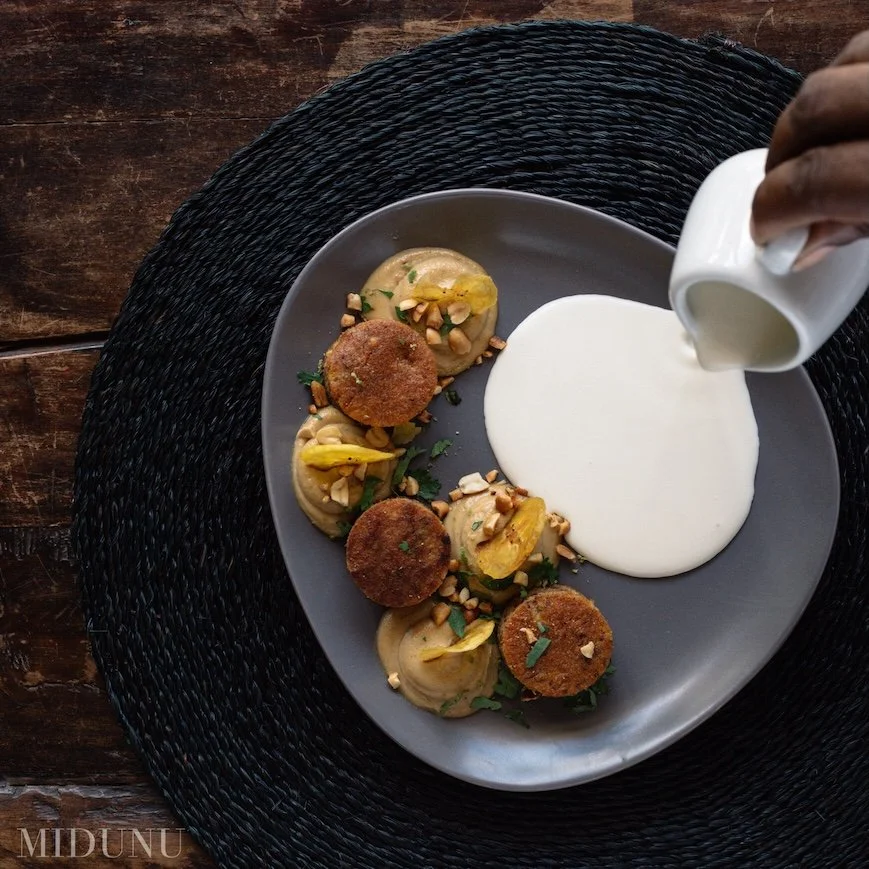The Cost of Passion: What It Takes to Run a Food Business in Africa
The Cost of Passion
I probably question everything once or twice a year. Sometimes more.
The passion is real, but so are the roadblocks. When you’re building something that doesn’t exist yet, being a pioneer isn’t glamorous. It’s lonely. Exhausting. Sometimes it flirts with madness.
There are days I wonder: Where’s the line between persistence and insanity? Between vision and delusion?
One of the clearest moments of doubt came during COVID, when we had to shut down our dining experiences—what felt like the heart of Midunu.
We pivoted to chocolate. Not as a fallback, but as an intentional extension of our mission. Cocoa has always been part of Ghana’s story—just not in a way that truly benefits the people who grow it.
But the pivot didn’t end there. It hasn’t ended at all.
Since 2020, we've been in a constant cycle of reviewing, adjusting, and rebalancing.
We’ve expanded into international markets. We’ve watched the global cocoa industry shift dramatically. We’ve navigated inflation, shipping disruptions, and staffing gaps. We’ve responded to continued requests from loyal diners at home.
The “what” has never changed:
Create income-generating opportunities for smallholder farmers and producers through delicious, indigenous, value-added food.
But the “how”?
That’s constantly evolving. Because it has to.
The Daily Chaos They Don’t Show on Instagram
People see the awards. The speaker panels. The glossy photos.
What they don’t see is me climbing up a water tower, praying that this isn’t how I die—during a dining event with a full guest list.
They don’t see me playing generator technician at midnight or talking sweetly to the fridge repair guy on a Sunday evening.
They don’t see the intern who forgot to close the fridge overnight...
Or the freezer that silently died during a power cut and took three days’ worth of food with it.
Some mornings, I wake up wondering: Which of my staff will actually show up today?
And other mornings, I’m in the market haggling with the market queen while my neighbor’s six peacocks strut through our outdoor kitchen like they own the place.
If you don’t laugh, you’ll cry. Honestly—humor has been my greatest survival tool.
You Are Your Own Worst Boss
Another truth no one tells you: when you build something from passion, you become your own worst boss.
There was a stretch where I was working 7 days a week, driving everyone—including myself—too hard. I had set an impossible standard... and I was holding myself hostage to it.
I’m still learning to be kinder to myself.
Some months you feel invincible—you’re doing cartwheels while looking at your bank balance.
Other months, you're googling how to fix a fan belt on a generator and wondering how much longer you can stretch your overhead.
And in those quiet moments, you miss the predictability of a steady paycheck... and remind yourself that your value is not your bank account.
The Sacrifices People Don’t Talk About
My immediate family is based in the U.S., and I don’t see them as much as I’d like. That weighs on me more than I let on.
And sometimes it shows up in the tiniest moments. Like when my mother asks for a dish she remembers from her childhood—one she used to eat, but never learned to make. And I get to recreate it for her. Give her that joy back. That moment is priceless.
Or when someone tastes something I made and says, “This reminds me of my grandmother.”
Or when we serve chocolate made in Ghana... in Switzerland.
When we show up in spaces we were never expected to be—and thrive there.
Turning Breakdown into Breakthrough
Not every idea starts in the boardroom. Some of the best ones begin on the side of the road.
One day, my car broke down under the late morning sun. While waiting for help—and some shade—I bought roasted groundnuts and fried plantain from a nearby vendor.
I'm team plantain. All day, every day.
Sitting there, snack in hand, something clicked. That roadside pairing—known locally as Kofi Brokman—was more than just a fill-in. It was a flavor memory, a cultural marker. And I realized: what if this could become more?
That quiet, unplanned moment gave birth to Kofi Richman—a signature dish on our menu for over six years now.
A celebration of textures, of groundnut and plantain.
A love letter to street food, elevated without being erased.
A reminder that even breakdowns can lead to creative breakthroughs—if we’re open to them.
What Would I Say to Anyone Romanticizing This Life?
If someone tells me they want to start a food business in Africa, I say: Make sure you want to do it with your whole heart. And be ready to pour in your blood, sweat, and tears.
Because it will take more than you think you have.
And it will teach you more about yourself than you thought there was to learn.
Why I Keep Going
It’s not the perfect days. It’s not the praise or panels.
It’s the mission.
It’s the smallholder farmer who grows something most people have forgotten.
It’s the guest who takes one bite and remembers where they came from.
It’s the possibility that we can build a food system rooted in culture, sustainability, and flavor—and do it with joy.
Because food systems change doesn’t always have to taste like a lecture.
Sometimes it tastes like groundnut soup.
Or a truffle.
Or Kofi Richman—born on a hot roadside, in a moment I didn’t see coming.
And that, for me, is more than enough.
📍Have you ever questioned your path and kept going anyway? What helped you stay the course? I’d love to hear your story.
➡ For more on food systems change and New African Cuisine, explore.
